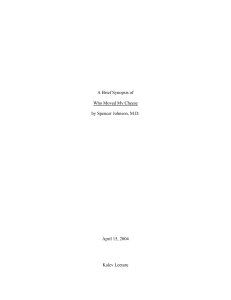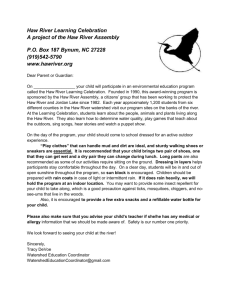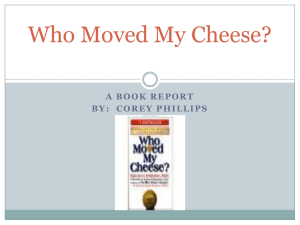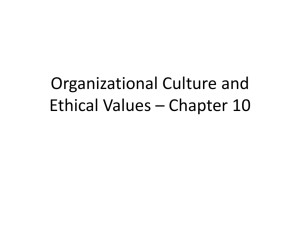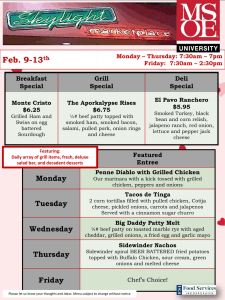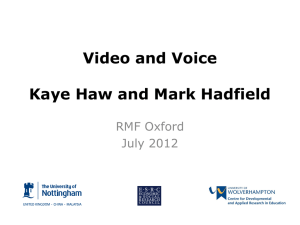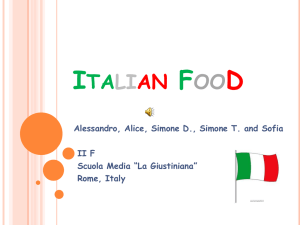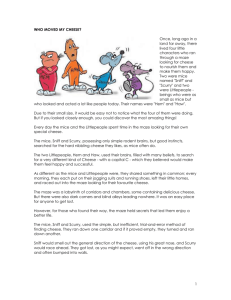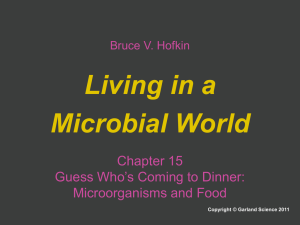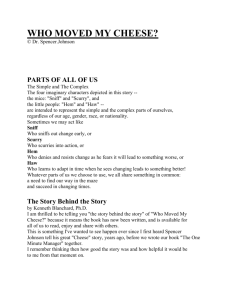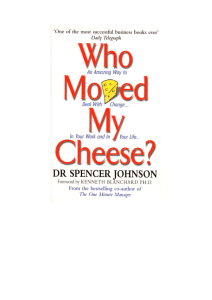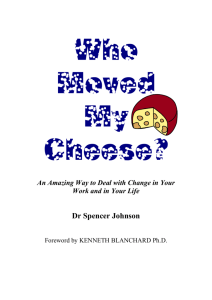Who Moved My Cheese PPT
advertisement
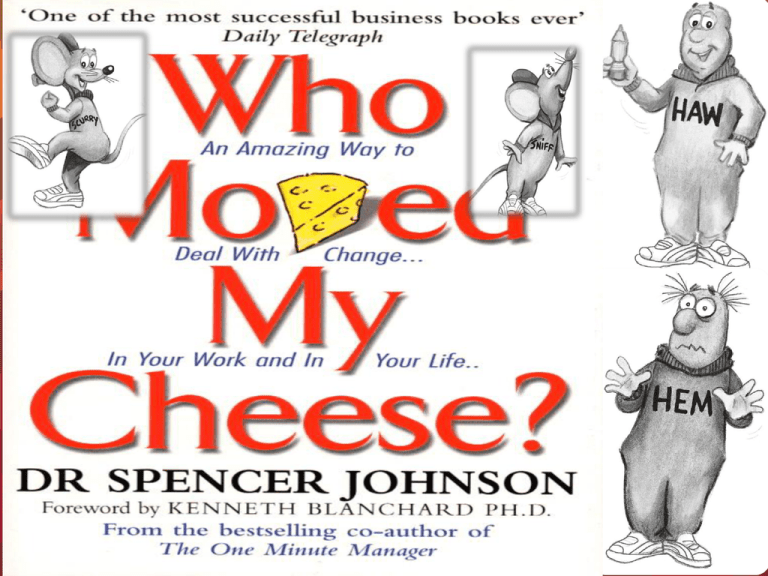
“Who Moved My Cheese?” Proverb: a traditional saying, e.g. “People in glass houses should not through stones.” Other examples from Spanish and Chinese are: “De tal palo, tal astillo” = like father like son “El que se fue a Sevilla, perdio su silla.” = Possession is 9/10 of the law. “Who Moved My Cheese?” Allegory: a poem, play, picture, etc, in which the apparent meaning of the characters and events is used to symbolize a deeper moral or spiritual meaning Ex. “The Giving Tree” “The Wizard of Oz” “Animal Farm” Movies- “District 9”, “Avatar” Metaphor: The Characters The characters are metaphors, while there are 4 of them, each one represents a different personality trait that each of us has when we encounter some type of change in our lives. Metaphor: Cheese 'Cheese' is a metaphor for what you want to have in life - whether it's a good job, a loving relationship, money, a possession, good health, or spiritual peace of mind. What is your cheese? What is a change you would like to see in your life? Metaphor: The Maze The Maze' is where you look for what you want – the organization you work in, the family you live with, your school or community you live in. What is your Maze? Part 1: The Cheese Metaphor The two Little people, Hem and Haw, used their complex brains, filled with many beliefs and emotions, to search for a very different kind of Cheese— with a capital C—which they believed would make them feel happy and successful. Ever hear of spending cheese? Part 1: The Maze Metaphor The Maze was a labyrinth of corridors and chambers, some containing delicious cheese. But there were also dark corners and blind alleys leading nowhere. It was an easy place for anyone to get lost. How does the maze parallel life decisions? What is the primary difference between the Mice and the men? “The situation at Cheese Station C had changed. So, Sniff and Scurry decided to change.” “Finally, he put his hands on his hips, his face turned red, and he screamed atthe top of his voice, "It's not fair!" “The Little people's behavior was not very attractive or productive, but it was understandable. Finding Cheese wasn't easy, and it meant a great deal moreto the Little people than just having enough of it to eat every day.” What Does the Writing on the Wall Mean? Consider this from Hem and Haw’s perspective. • Is it hard for them to adapt to they are confronted with change? • What advice does this give us about change? What can we learn from their example? “Hem and Haw went home that night hungry and discouraged. But before they left. Haw wrote on the wall:” Notice & Respond: We all lie to ourselves sometimes to help us feel safe! How does Haw do this? “Haw shut his eyes as tight as he could and put his hands over his ears. He just wanted to block everything out. He didn't want to know the Cheese supply had gradually been getting smaller. He believed it had been moved all of a sudden.” Sniff •Sniffs out and anticipates change sooner than most kids. •Because he anticipates, Sniff is better prepared for change. •Alert to small changes that may lead to larger changes. •Expects change to occur in life. •Can adapt and change. Scurry •Scurries into action quickly when change occurs, so he changes and wins sooner than most kids. •Easily changes direction, if needed. •Can adapt and change. Hem •Gets hemmed in by his reluctance to change. •Wants to stay in comfortable surroundings. •Gets stuck in fear and discomfort. •Gets angry, blames others, gets depressed. •Cannot adapt and doesn’t change, so he loses. Haw •At first he “hems and haws,” but is able to laugh at his fear of change (haw, haw!). •Is able to see the real situation. •Can adjust. •Is happy when he changes and finds something better. Notice & Respond: Not only do we sometimes avoid Notice & Respond: Does the following attitude help the you use change, sometimes we create change to itself betterby yourself? problem avoiding the truth! "Why should we change?" Hem asked. "We're Little people. We're special. This sort of thing should not happen to us. Or if it does, we should at least get some benefits." "Why should we get benefits?" Haw asked. "Because we're entitled," Hem claimed. Notice & Respond: What is the biggest obstacle Hem and Haw have to overcome so they can find new Cheese? “it's dangerous out there.“ "No it isn't" Haw argued. "We've run through many parts of the Maze before, and we can do it again." "I'm getting too old for that," Hem said. "And I'm afraid I'm not interested in getting lost and making a fool of myself. Are you?" Notice & Respond: What is the biggest difference between Hem and Haw? What do we learn from him? "Haw, haw, look at us. We keep doing the same things over and over again and wonder why things don't get better. If this wasn't so ridiculous, it would be even funnier." What Does the Writing on the Wall Mean? What are we supposed to learn from Haw here? What Does the Writing on the Wall Mean? Think or reflect by yourself for a moment. What could you accomplish if you were not afraid of change? Who would you be? What would you do? Notice & Respond: What does the author want us to learn by allowing Haw to find a little cheese as he sets out on his journey. "During the next several days, Haw found a little Cheese here and there, but nothing that lasted very long. He had hoped to find enough Cheese to take some back to Hem and encourage him to come out into the Maze. What Does the Writing on the Wall Mean? “Haw now realized that the change probably would not have taken him by surprise if he had been watching what was happening all along and if he had anticipated change.” Notice & Respond: What does Haw feel like when writing this? What does he have to keep on reminding himself about? 1. He is afraid, and Feels like going home. 2. He is better off trying than not doing anything at all. He felt best when Moving. Notice & Respond: What are we to learn from this example? As he started running down the dark corridor he began to smile. Haw didn't realize it yet, but he was discovering what nourished his soul. He was letting go and rusting what lay ahead for him, even though he did not know exactly what it was. Do you agree or disagree? When has this been true for you? How might this help you in the future? What is up with Hem anyway? How would you describe Hem here? Do you know anyone who acts like Hem? Business Seminar Preview! Having Cheese makes You Happy Movement in a New Direction Helps You Find New Cheese! The More Important Your Cheese is to You, The More You Want to Hold on to it When You Stop Being Afraid you Feel Good! If You Do Not Change, You Can Become Extinct Imagining Yourself Enjoying Your New Cheese Leads You To It! What Would You do, if You Weren't Afraid? The Quicker You Let Go of Your Old Cheese, The Sooner You Find New Cheese! Smell The Cheese Often so You Know When its Getting Old. It is Safer To Search in a Maze, Than to Remain in a Cheesless Situation!
